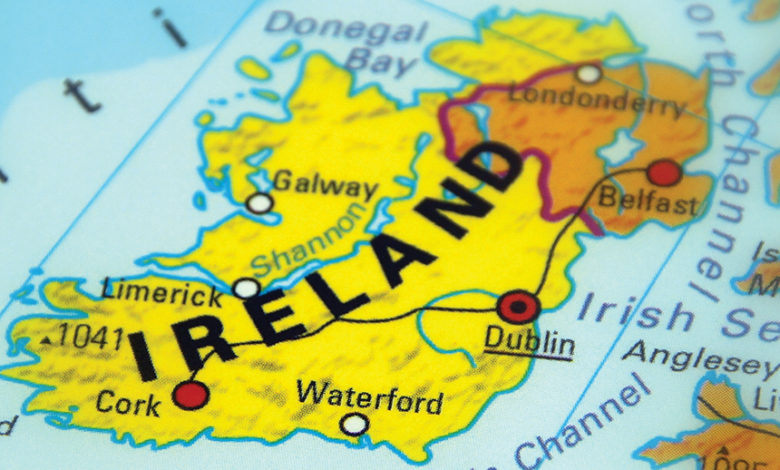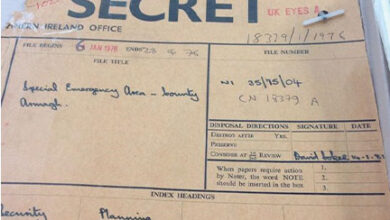The Protocol, the Prime Minister, and prospects for Irish unity

The careers of Conservative Party prime ministers have been among the many casualties of Brexit, write Mary C Murphy (UCC) and Jonathan Evershed (UCD), authors of A Troubled Constitutional Future: Northern Ireland after Brexit published by Agenda Publishing in March 2022.
In Northern Ireland, ongoing uncertainty in relation to the implementation of the Ireland/Northern Ireland Protocol; the British Government’s plans to proceed with the highly contested Northern Ireland Protocol Bill; and the collapse of the Northern Ireland Executive have all added to an existing atmosphere of instability and volatility. This state of unsettledness has also influenced and facilitated a growing discourse about the prospects for Irish unity. Some see Irish unification as the organic and inevitable outcome of Brexit’s legacy while others reject and oppose this prospect.
The Prime Minister Liz Truss MP faces urgent challenges – not least a rapidly intensifying cost of living crisis – but the Protocol issue and the “Irish question” will also loom large. Although the potential for a constitutional rupture exists, there is no guarantee that profound constitutional transformation is inevitable. However, how Truss navigates the period ahead will have a bearing on the strength and intensity of the evolving constitutional debate in Ireland: her decisions and actions on the Protocol will influence how different political parties, civic society movements and future Irish governments position themselves on the Irish unity question.
For its part, the British Government does not support calling a border poll and this will not change. Successive Conservative governments have sought to assert an increasingly muscular form of unionism which has been alienating not just for nationalists in Northern Ireland, but across Scotland and Wales too.
Further British Government action on the Protocol may serve to either reduce or reinforce wider calls for a border poll and constitutional change in Ireland. Should Truss oversee the Northern Ireland Protocol Bill becoming law, the EU will likely retaliate with (further) court proceedings against the UK. In this context, the prospects of a bitter and damaging trade war between the UK and the EU cannot be discounted. Such a move would be highly damaging politically and economically, and likely intensify calls among nationalists for constitutional change. Critically, it may also sway otherwise undecided voters in Northern Ireland and the Republic of Ireland.
A related factor here is the poor level of trust between the British and Irish governments. This has undermined the bilateral relationship and upended what had previously become a more consensus-based approach to Northern Ireland. If Truss chooses to work to address the challenges facing British/Irish relations (most of them concentrated around the Protocol) in a spirit of meaningful collaboration, this bodes well for restoring an atmosphere of cooperation and consensus, which has historically been critical to stability in Northern Ireland. If not, the push for constitutional change may well intensify.
 |
 |
The current Irish Government has ruled out supporting a border poll in the short to medium term. Instead, Taoiseach Micheál Martin TD has ploughed money and commitment into his department’s Shared Island Initiative. Its emphasis is less on constitutional change, and more on supporting the full operation of the 1998 Agreement. Importantly however, the next Irish Government – particularly one that might be led by Sinn Féin – is likely to take a different and stronger position on the border question.
Unionists in Northern Ireland are utterly opposed to a border poll and are loath to even discuss or consider the question. Instead, unionism has remained resolutely focused on resisting the Protocol, which they see as undermining Northern Ireland’s place in the union, and on supporting the Northern Ireland Protocol Bill. How Truss engages with unionism on the Protocol issue will be consequential, and not just for unionism but for all in Northern Ireland. A more considered position on, and a more inclusive approach to, the Protocol which takes note of all swathes of opinion in Northern Ireland may temper calls for an intensification of the Irish unity debate.
The third force in Northern Ireland politics – that which is classified as ‘other’ and is neither unionist nor nationalist in outlook – is also reticent about a referendum on Irish unity. This political category includes the Alliance Party, a party which has been gradually increasing its electoral appeal and is now the third largest political party in Northern Ireland after Sinn Féin and the DUP.
Alliance does not take a position on the constitutional question. However, it is Northern Ireland’s ‘others’ who will be decisive in shaping the future direction of the constitutional debate in Ireland. Alliance supporters are more malleable on the constitutional question than are committed nationalists and unionists. How Truss deals with Northern Ireland and the interests of this constituency may prove critical in directing the nascent constitutional debate.
Sinn Féin is spearheading calls for a border poll. For many nationalists, the chaotic manner in which the British Government has managed Northern Ireland interests since the Brexit vote, has been a decisive factor in swaying them towards more serious and more immediate contemplation of an altered constitutional future. Brexit has also precipitated the emergence of civil society groups including Shared Ireland, Think32, and others actively pushing for a border poll. This cohort is already focused on the achievement of a new constitutional future, and regardless of the actions of Truss, is unlikely to backtrack on its push for constitutional change.
Importantly, however, for all the unsettledness which Brexit has created in Northern Ireland, it has not led to the emergence of majority support for constitutional change. Despite important shifts in public opinion flowing from Brexit, opinion polls continue to suggest a majority in favour of Northern Ireland remaining part of the UK. It is not clear, therefore, that the UK vote to leave the EU will inevitably lead to a new constitutional settlement for the island of Ireland. What is clear however, is that Truss and how she deals with the Protocol issue will be a critical factor influencing the direction of the constitutional debate.





